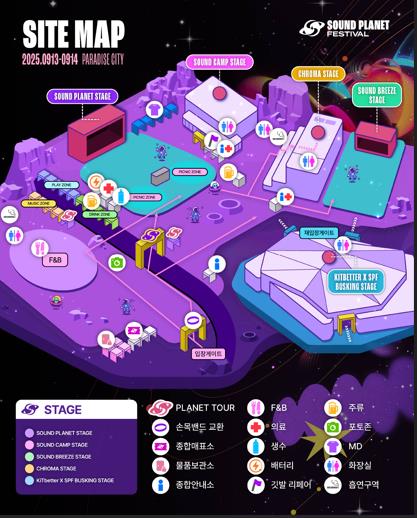Rolling Hall’s 30th-anniversary celebration connects the club’s indie roots with a wider audience.
About 70 domestic and international acts will perform across five stages.
Meanwhile, the event positions itself as both an expansion of the music ecosystem and an industrial experiment.
“Rolling Hall at 30: What does the festival ask and answer?”
It blends exhibitions and live shows.
First, note that Rolling Hall is a live club founded in 1995 in Hongdae (a Seoul neighborhood known for its indie music scene).
Therefore, the 30-year history of Rolling Hall reads like a milestone in Korean indie music.
Consequently, Sound Planet is not just a sequence of concerts but a commemorative program shaped around that legacy.
Moreover, indie bands, K-pop acts, idols, and emerging artists will share five stages, making tradition meet the present.
Next, the five stages—Sound Planet Stage, Sound Camp, Sound Breeze, Chroma, and a busking stage—are programmed to offer different audience experiences by genre and mood.
At the same time, participation by global audio and instrument companies (for example, Yamaha Music Korea) enables industrial experimentation with sound technology.
However, the logic of large-scale commercial operation remains a persistent source of tension.

Still, the festival aims to broaden Rolling Hall’s identity.
On the other hand, it risks clashing with expectations held by traditional indie fans.
The core of that clash is the balance between artistic autonomy and industrial expansion.
Ultimately, how organizers design that balance will determine the festival’s long-term sustainability.
History is about connection.
To begin with, since it opened in 1995, Rolling Hall has been a central venue for Hongdae’s indie network.
Over decades, bands and artists that emerged from this space have reshaped Korea’s popular music map.
Therefore, this festival celebrates that trajectory while opening a gateway for the next generation.
For example, seeing veteran performers and rookies share a stage visualizes intergenerational exchange.
Moreover, historical memory is not mere nostalgia.
Instead, it provides context that helps us understand today’s music environment.
Rolling Hall’s 30 years reveal both the social role and limits of independent art.
On that basis, the festival becomes an occasion to reinterpret indie tradition.
We must ask what the festival means.
First, Sound Planet’s meaning is multi-layered.
For one, it blurs the line between indie and popular music, attracting new listener groups.
Second, by combining performances, exhibitions, and showcases, it expands the music industry’s ecosystem.
Third, global collaboration creates a stage for international exchange.
Consequently, the festival produces cultural capital beyond simple entertainment.
In particular, showcase stages and networking events are real assets for emerging artists.
At the same time, corporate sponsorships and technical partnerships strengthen operational capacity.
However, the tension between commercial interests and artistic integrity remains a recurring debate.
Arguments in favor.
Proponents first emphasize the expansion of musical diversity.
For instance, putting indie bands and K-pop idols on the same lineup creates new audiences.
As a result, collaborations and crossovers between genres can flourish.
That circulation is positive for the health of the music ecosystem.
Moreover, supporters point to ripple effects for the local economy and cultural industries.
Large festivals increase demand in lodging, restaurants, and transport, benefiting nearby businesses.
In short, a major event in the Incheon–Yeongjong area can boost local economic activity and tourism.
Additionally, global sponsorships and visiting artists promote international exchange.
Also, the festival helps discover and support new talent.
Performance experience and media exposure widen career paths for emerging musicians.
Sound Planet offers showcases and workshops that give newcomers hands-on opportunities.
Over time, that strengthens the industry’s infrastructure and can influence entrepreneurship and business planning in music.
Finally, passing on Rolling Hall’s historical symbolism is central to the pro argument.
Compressing 30 years of history into a festival strengthens cultural identity.
That identity can become a cultural asset connecting place and generations.
In sum, the festival is both cultural investment and a field test for sustainable music ecosystems.
Voices of concern.
Critics first warn about commercialization.
They argue that a large-scale event built on Rolling Hall’s brand could weaken indie autonomy.
In practice, indie music might become sidelined or crowded out by lineups that favor mass appeal.
Such a trend could reduce the space for independent artistic expression.
Next, the tilt toward popular programming is often pointed out.
Booking acts with strong box-office draw—like idol groups—helps ticket sales and media exposure.
However, that approach can limit the steady audiences indie artists need to grow.
In the long run, it may undermine the indie scene’s ability to sustain itself.
Furthermore, local residents’ environmental concerns cannot be ignored.
Large crowds bring noise, traffic congestion, and waste issues that strain neighborhoods.
Resident acceptance directly affects whether the festival can continue.
Therefore, consultation and mitigation measures with the community are essential.
Finally, questions about long-term viability persist.
Although organizers aim for an annual event, maintaining audience interest and fresh content each year is not easy.
Repeated formats or creative exhaustion could drive audiences away.
As a result, some fans strongly criticize any dilution of Rolling Hall’s traditional indie character.
Analyzing causes and responses.
The festival’s plan is clear.
It leverages Rolling Hall’s historical assets to pursue both popular appeal and artistic depth.
This strategy aims to diversify the music market and expand the fan base.
However, strategic choices inevitably produce tensions.
Online reaction has been mixed.
Many users welcome the diverse lineup and the scale of the festival.
Meanwhile, traditional indie fans express anxiety about commercialization.
These reactions reflect different cultural expectations and value judgments.
Moreover, technical partnerships and international cooperation can raise the festival’s level.
Yet the sponsorship and investment process risks letting commercial logic dominate artistic decisions.
Therefore, organizers must establish safeguards for artistic independence and transparent decision criteria.
Such measures are essential for audience trust and long-term sustainability.
Practical recommendations.
For the festival to endure, several practical steps are needed.
First, ensure balanced programming so indie artists receive fair stage time and promotion.
Second, set up a community liaison to manage environmental impacts and noise in advance.
Third, create rules that protect artistic independence during sponsorship and investment negotiations.
These norms will safeguard the festival’s public value and cultural mission.
Fourth, pair talent discovery programs with long-term development support.
From a long-term view, funds and investment should flow into a system that nurtures new artists.
Finally, strengthen communication with audiences to reduce the gap between expectations and experience.
Providing clear lineup information and program explanations builds trust.
Audience participation projects reinforce the festival’s identity.
Taken together, these steps support qualitative growth.

Summary and outlook.
In short, Sound Planet Festival marks Rolling Hall’s 30th anniversary and is a cultural event of significance.
At once it honors indie tradition and seeks broader popular reach through a mixed program.
The experiment stimulates the wider music industry and encourages new collaborations.
However, commercialization, local impact, and identity preservation remain unresolved challenges.
Therefore, organizers, residents, artists, and audiences must share responsibility.
Transparent operation, fair stage distribution, and mitigation of local harm are non-negotiable.
Additionally, long-term funding and investment strategies should support emerging talent and ecosystem maintenance.
Above all, business and artistic perspectives must be balanced in decision-making.
In conclusion.
The core idea is simple.
Sound Planet is both a commemoration and an attempt at expansion.
Its value lies in promoting diversity and testing industrial possibilities.
However, sustaining that value requires transparent operations and care for the local community.
To summarize, Rolling Hall’s 30th festival is an opportunity to extend a cultural asset.
At the same time, failing to balance artistry and commerce risks diluting tradition.
Thus, the festival’s future will depend on its founding philosophy and how it is managed.
Do you think the event can attract new audiences while preserving the indie spirit?